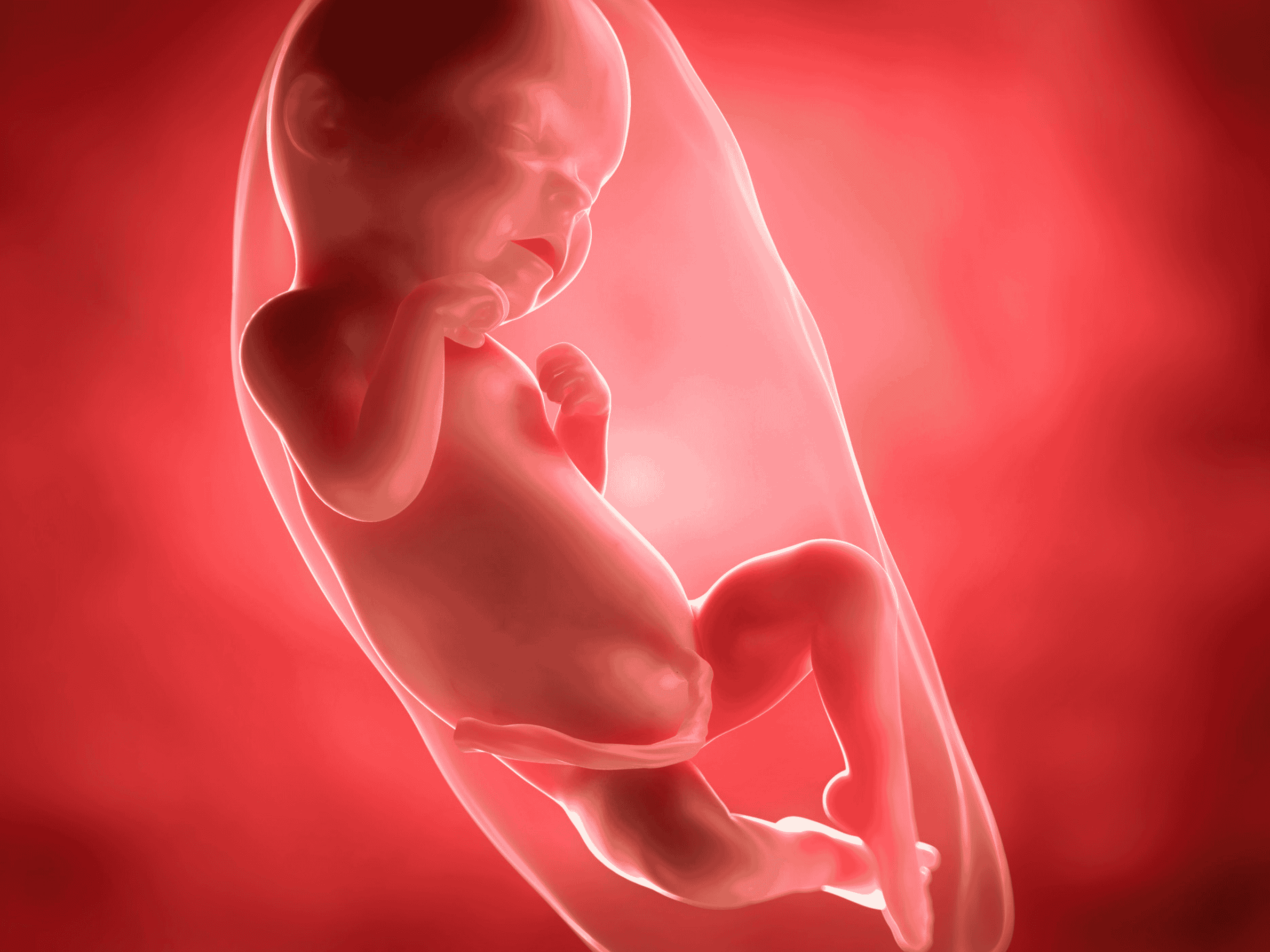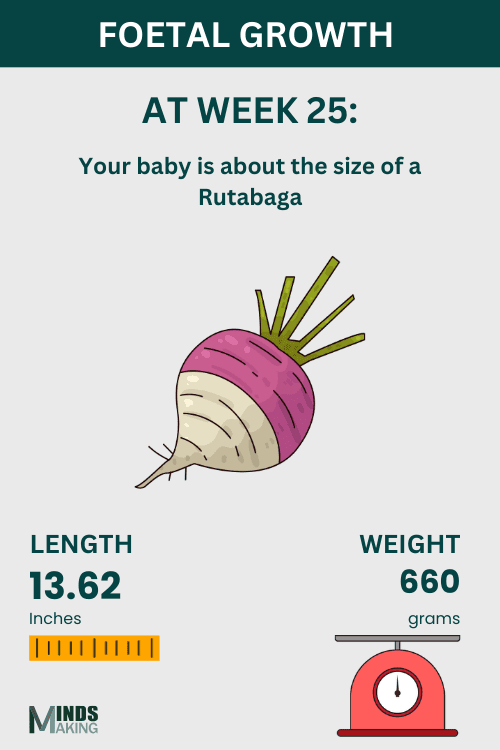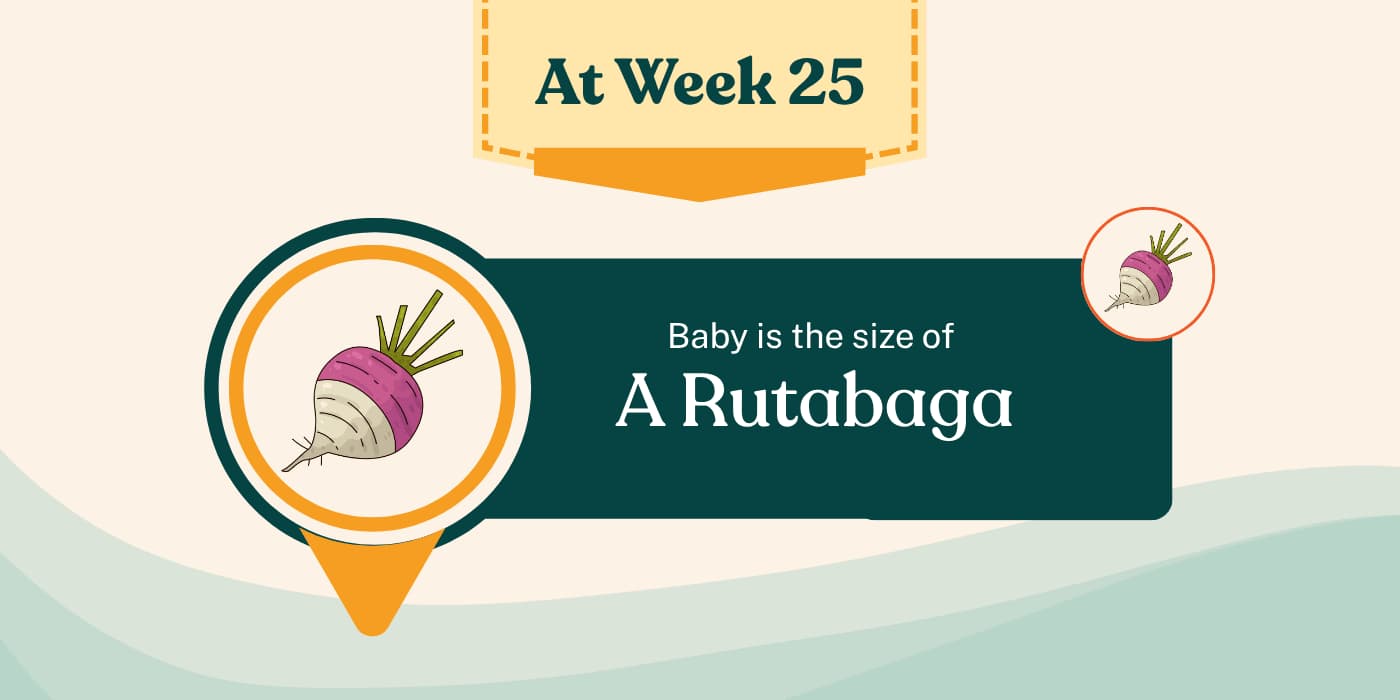Your Pregnancy at Week 25
Science photo library

Written by Mindsmaking Medical Writer
Fact Checked by Mindsmaking Professionals
23rd, December, 2025
You are in your twenty-fifth week of pregnancy, with two more weeks to complete your second trimester.
Welcome to your twenty-fifth week of pregnancy. You are in your sixth month, with two more weeks to complete your second trimester. In a few weeks, you will be entering your third and final trimester.
Key Takeaways
Your baby gradually gains baby fat, which helps their skin look smoother and less wrinkled.
Your baby measures around 13.62 inches and weighs about 660 grams, comparable to a rutabaga.
Progesterone slows stomach emptying and relaxes the stomach valve, allowing acidic contents to reflux into the oesophagus.
At 25 weeks, your uterus is approximately the size of a football, which may feel somewhat awkward.
Pregnancy-related pelvic girdle pain (PGP) occurs when pelvic joints become misaligned or stiff and can make movements like walking, climbing stairs, turning in bed, or getting in and out of a car challenging.
Noticeable puffiness and swelling in your face, hands, and feet are usually harmless and caused by water retention. However, mention this to your midwife or doctor to check your blood pressure and rule out pre-eclampsia.
Lying on your left side instead of your back is important. It prevents your uterus from compressing vital blood vessels, ensuring an oxygen supply to the placenta and baby.
Participating in activities like using an exercise ball or doing pregnancy yoga can encourage and help them stay motivated.
Take a peek

Fat
Baby fat is developing! Even though your unborn child is still thin, he is gradually gaining weight and losing his wrinkly appearance.

Reflexes
Don't frighten the baby! Your child's startle reflexes are now maturing.

Visible hair
If your growing baby has hair, which not all do, the texture may be visible at this stage.
Baby Development at Week 25
Though your baby might still seem quite small, they gradually gain baby fat, which helps their skin look smoother and less wrinkled. If your baby has hair, you may see its colour and texture now, but remember that this could change after birth. (2)
Your baby's skin is becoming smoother and pinker, making them look more like newborns. Their nipples are forming, and the nostrils, which were previously plugged, have now cleared, allowing your baby to practise breathing with amniotic fluid. Sleep cycles have developed, and you'll notice their sleep patterns. Your baby has become skillful and can grasp their feet and make a fist.
The umbilical cord is now thick and resilient, containing a single vein and two arteries encased in a firm jelly-like substance that prevents kinking and knotting.
This is an active time for your baby. Loud noises might cause them to jump and kick, which won't hurt you but could be surprising. You might also feel those hiccups from time to time. Your baby is now urinating into the amniotic fluid. At this point, most of the fluid surrounding your baby is urine, which provides cushioning and helps maintain a cozy and stable temperature. (6)
Mindsmaking

Body Changes at Week 25
Even though you're still feeling fairly energetic, you might experience a bit of breathlessness. This can be due to your baby taking up more space, but it might also be a sign of anaemia. You'll have a blood test at 28 weeks to check your iron levels, but it's worth speaking to your GP if you're struggling.
Haemorrhoids are another unpleasant side effect of pregnancy. They are caused by the added pressure of your baby on your digestive system and are often worsened by constipation. To alleviate this, ensure you stay hydrated and consume plenty of fibre. This should help keep your stools soft and reduce the need for straining.
Worrying about weight gain is natural, especially in the second trimester when your baby is growing rapidly. To manage your weight healthily, try to eat in moderation and engage in regular light exercise.
The hormone progesterone slows stomach emptying and relaxes the valve at the stomach's entrance, preventing it from closing properly. This allows acidic stomach contents to flow back into the oesophagus, causing reflux or heartburn, making enjoying your favourite meals difficult.
In the last few months of pregnancy, the expanding uterus adds extra pressure on the stomach. To manage this, try eating smaller, more frequent meals and avoid spicy and fatty foods.
Read This Next
No posts available
Baby Bump At Week 25
As your baby develops, so will you; your body will gain weight to support your growing child. If you gain a pound each week, you will likely gain more weight during the second and third trimesters if your weight was normal when you started.
Your uterus is now the size of a football, so you might feel a bit awkward moving around. As the skin over your abdomen stretches, it can become itchy. Regularly moisturise and use hypo-allergenic toiletries to keep your skin from drying out. It's important to keep up with some light exercise as long as you feel well. However, never exercise if you feel dizzy or short of breath.
Pregnancy Symptoms at Week 25

Pelvic girdle pain
Pregnancy-related pelvic girdle pain (PGP) may cause discomfort in your pelvic area. This pain occurs when your pelvic joints become misaligned or stiff, leading to pain in the front or back of your pelvis. The pain can be intense, making movement challenging, especially when walking, climbing stairs, turning in bed, or getting in and out of a car. It's essential to seek a diagnosis promptly to manage the pain effectively. While it's important to stay active, avoid heavy lifting, prolonged standing, or sitting for extended periods, as these can worsen the pain. Focus on gentle exercises and movements that are comfortable for you.

Trouble sleeping
In the second trimester, some women may struggle with sleep due to various reasons such as hormonal changes, discomfort from their growing body, or general anxiety about the pregnancy. To improve your sleep quality, consider turning off electronic devices by 8 pm to avoid the stimulating effects of blue light that can keep you awake. Ensure your bedroom is dark and conducive to sleep. If you cannot sleep, getting up and walking around the house is better than lying in bed and becoming more frustrated. This can help you relax and make it easier to return to sleep when ready.

Burping
You may notice that you're burping more frequently than usual, but there's no need to worry, as this is quite common during pregnancy. You might also find it challenging to eat your normal-sized portions, and after eating or drinking, you could experience a burning sensation in your chest, nausea, or bloating. This is likely due to indigestion or heartburn. Try eating smaller meals more frequently throughout the day to alleviate these symptoms. This can help manage indigestion and reduce discomfort.

Restless leg
About 10 to 46 percent of women experience Restless Legs Syndrome (RLS) during pregnancy. This condition is a sensory-motor disorder characterised by an irresistible urge to move the legs, particularly during rest or inactivity. It is often accompanied by uncomfortable sensations in the legs that movement can temporarily alleviate. Certain lifestyle factors, such as smoking, alcohol consumption, and caffeine intake, are known triggers for RLS. Managing these triggers and adopting lifestyle changes can sometimes help reduce the frequency and severity of RLS symptoms.

Braxton hicks contraction
At 25 weeks pregnant, you might start experiencing Braxton Hicks contractions. These are practice contractions that help your body prepare for birth. They can feel like a slight tightness in your abdomen and vary from mild to somewhat painful. Contact your healthcare provider for guidance and reassurance if you have any concerns or questions about these sensations.

Fuller hair
Your hair might seem fuller and more lustrous than ever. This isn't because you're growing more hair, but due to hormonal changes causing the hair you'd normally shed to stick around longer. Unfortunately, this extra hair will fall out after you give birth.
Pregnancy Concerns at Week 25
Watch out for feelings of shortness of breath and difficulty in breathing in your week 25. Quickly consult your healthcare provider if you experience any of these. Speak with your Ob-Gyn or midwife if you experience a burning sensation during urination accompanied by fever and foul-smelling vaginal discharge.
Your obstetrician will give you some baby-safe antibiotics to use. You might start noticing puffiness and swelling in your face, hands, and feet. This is usually harmless and is caused by water retention, but it's important to mention it to your midwife or doctor. They will want to check your blood pressure to rule out pre-eclampsia, a potentially dangerous condition.
Pre-eclampsia can develop in the second half of pregnancy or after the baby is born.
Contact your doctor or midwife if you experience other symptoms, such as severe headaches, vision problems, or pain just below the ribs. (6)
Health Tips for Pregnancy Week 25
Obtain dietary copper
During pregnancy, your body requires more copper, a mineral essential for your baby's lung, skin, bone, and immune system development. Insufficient copper can negatively affect these areas. It's best to obtain this additional copper through food rather than supplements. Safe and rich sources of copper during pregnancy include seeds and nuts, wheat bran cereals, whole grain products, and, delightfully, chocolate.
Moisturise your belly
It's common to experience itchy skin during pregnancy caused by hormonal changes and your growing belly stretching your skin. Moisturisers can help soothe the itchiness and prevent dryness. Taking cool baths and wearing loose-fitting clothes made from natural materials can also provide relief. While itchy skin is generally harmless, it cannot be very pleasant. If the itching becomes severe, particularly at night or on the palms of your hands and soles of your feet, you should consult your doctor. Itchiness can also signal the start of stretch marks due to collagen stretching and fibres rupturing under the skin. Remember, stretch marks are nothing to be ashamed of. It can be challenging to adjust to the changes in your body, but many people are embracing and proudly showing off their stretch marks.
Establish a bedtime routine
You need a good night's sleep now more than ever, but as soon as you lie down, your baby starts moving. This happens because your daytime activities lull your baby to sleep with all the movement, but when you slow down, your baby wakes up and becomes active. While you can't do much about your night owl baby, you can try to fall asleep faster by establishing a bedtime routine for yourself. This is also good practice for when you'll need a routine for your baby. Before bed, take a warm bath, put on comfortable pyjamas, do a few relaxing yoga poses or stretches, and read a book while playing soft, soothing music in the background. A calming bedtime routine can help you drift off to sleep more easily.
Stay away from secondhand smoking
Secondhand smoke is nearly as harmful as direct smoking, and your placenta cannot filter out all the carbon monoxide and other chemicals you passively inhale. If you are still smoking, it's crucial to make every effort to quit. Hypnotherapy, acupuncture, and support groups have shown proven benefits in helping people stop smoking, improving their chances of quitting successfully.
Always sleep on your side
Start getting used to lying on your left side instead of your back. This is because your heavy uterus can compress crucial blood vessels, reducing oxygen supply to the placenta and baby. Additionally, lying on your back for extended periods can make you feel lightheaded or faint. Invest in high-quality pillows and arrange them for maximum comfort in bed.
Advice for Partners
Support your pregnant partner by joining them in their exercise routine—at home or in a class. Participating with them, whether using an exercise ball or doing pregnancy yoga, can provide valuable encouragement and help them stay motivated. Your involvement can boost their confidence and improve their body image during this time. Plus, it's a great way to maintain your health and fitness!
When was the last time your partner enjoyed a manicure or pedicure? These simple luxuries often take a back seat during pregnancy but can significantly boost her mood. Consider getting her a gift certificate or scheduling a manicure or pedicure appointment. If you're on a budget, you can give her a "salon-quality" treatment at home with a few supplies, which includes:
- Bowl or pan with warm water to soak her hands or feet to soften the skin.
- Lotion or bath oil mixed with sugar for exfoliating to smoothen her skin.
- Soft towel for drying her hands and feet gently.
- Lotion or cream to keep her skin moisturised after you are done.
- Nail polish.
- Nail clippers and file to shape and trim her nails.
- Flip flops to ensure she can walk around without smudging her freshly painted toes.
- This thoughtful gesture can help her feel pampered and appreciated.
Pregnancy Checklist for Week 25
- Now is an excellent time to think about taking childbirth classes. These classes offer valuable information on labour and delivery. It's beneficial for your partner or whoever will support you during childbirth to attend as well.
- Besides traditional childbirth classes, you might consider enrolling in yoga sessions. Yoga can help you mentally and physically prepare for childbirth by teaching you effective breathing and relaxation techniques.
- If you haven't already, now is a good time to start planning your maternity leave. Understanding your entitlements and how they impact your household finances can be beneficial, so do some research now.
- It's also a good idea to start thinking about any handovers or who will cover your duties while you're on maternity leave. Although you still have time to plan, being prepared can help you feel more relaxed as your pregnancy progresses.
- Ensure you're up-to-date with important vaccinations, such as the flu shot, the Tdap (tetanus-diphtheria-acellular pertussis) vaccine, and the COVID-19 vaccine or booster.
Frequently Asked Questions
How big is my baby at week 25 of pregnancy?
In week 25, your baby is about the size of a rutabaga, weighing about 660 grams and measuring 13.62 inches in length. You're almost into the third trimester, and your kid is growing, which also means you're growing, and your kid has now occupied ample space in your stomach.
What "should" I be doing at 25 weeks pregnant?
Though there is no definitive "should" when it comes to pregnancy, there are recommendations to help you and your baby stay healthy. At 25 weeks pregnant, consider maintaining a balanced diet and regular exercise. It's also a good time to explore your birthing options and sign up for birthing and parenting classes. Planning your maternity leave and making a list of the baby gear you need can also help you feel more prepared for your baby's arrival.
How far along is my baby's development at 25 weeks pregnant?
At 25 weeks pregnant, your baby is in a crucial stage of growth and development. They are rapidly gaining weight, and their organs are continuing to mature. By 29 weeks, key developments such as the maturation of the lungs, brain, and digestive system will be largely complete. From this stage onward, the baby's primary focus will be accumulating fat to help regulate their body temperature after birth and build muscle mass.
How can I relieve pelvic pain at pregnancy week 25?
To relieve pelvic pain during pregnancy, start by consulting a healthcare provider for a proper diagnosis and personalised advice. Engage in gentle exercises such as prenatal yoga, swimming, or walking to strengthen the pelvic floor and core muscles. Maintain good posture, avoid heavy lifting, and use a pregnancy support belt for added stability. Applying heat or cold therapy can help soothe the pain, while resting with a pillow between your knees can keep your pelvis aligned. Wearing supportive shoes, getting a prenatal massage, or trying acupuncture may also provide relief. Always ensure any new treatments or exercises are approved by your healthcare provider.
What should I try to avoid at 25 weeks pregnant?
As with every other week of your pregnancy, at 25 weeks, you should avoid alcohol, large amounts of caffeine, certain types of fish, and processed meats, just as you have throughout your pregnancy. Equally important is incorporating healthy foods into your diet. Opt for high-fibre, complex carbohydrates over simple carbs like white rice and white bread, and avoid sweetened drinks and junk food. Maintaining a healthy diet is crucial, but it's also fine to indulge occasionally without feeling guilty if you opt for a treat instead of something more nutritious.
Was this article helpful?
How many stars are you giving this article?
Leave a comment
Your email address will not be published.










































